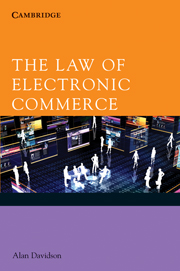Book contents
- Frontmatter
- Contents
- Acknowledgements
- Table of Cases
- Table of statutes
- 1 The law of electronic commerce
- 2 The rule of cyberspace
- 3 Electronic commerce and the law of contract
- 4 Shrinkwrap, clickwrap and browsewrap contracts
- 5 Electronic signatures
- 6 Copyright issues in electronic commerce
- 7 Electronic commerce – trade marks, patents and circuit layouts
- 8 Domain names
- 9 Domain name disputes
- 10 Uniform domain name dispute resolution policies
- 11 Jurisdiction in cyberspace
- 12 Defamation in cyberspace
- 13 Privacy and data protection in cyberspace
- 14 Electronic mail and online presence
- 15 National electronic surveillance
- 16 Cybercrime
- 17 Evidence of electronic records
- 18 Censorship – Broadcast and online content regulation
- 19 An international perspective
- Appendix A Electronic Transactions (Victoria) Act 2000
- Appendix B UNCITRAL Model Law on Electronic Commerce
- Appendix C Selected provisions Copyright Act 1968 (Cth)
- Appendix D ICANN Uniform Dispute Resolution Policy (UDRP)
- Appendix E .au Dispute Resolution Policy (auDRP)
- Appendix F National Privacy Principles
- Index
- References
12 - Defamation in cyberspace
Published online by Cambridge University Press: 05 June 2012
- Frontmatter
- Contents
- Acknowledgements
- Table of Cases
- Table of statutes
- 1 The law of electronic commerce
- 2 The rule of cyberspace
- 3 Electronic commerce and the law of contract
- 4 Shrinkwrap, clickwrap and browsewrap contracts
- 5 Electronic signatures
- 6 Copyright issues in electronic commerce
- 7 Electronic commerce – trade marks, patents and circuit layouts
- 8 Domain names
- 9 Domain name disputes
- 10 Uniform domain name dispute resolution policies
- 11 Jurisdiction in cyberspace
- 12 Defamation in cyberspace
- 13 Privacy and data protection in cyberspace
- 14 Electronic mail and online presence
- 15 National electronic surveillance
- 16 Cybercrime
- 17 Evidence of electronic records
- 18 Censorship – Broadcast and online content regulation
- 19 An international perspective
- Appendix A Electronic Transactions (Victoria) Act 2000
- Appendix B UNCITRAL Model Law on Electronic Commerce
- Appendix C Selected provisions Copyright Act 1968 (Cth)
- Appendix D ICANN Uniform Dispute Resolution Policy (UDRP)
- Appendix E .au Dispute Resolution Policy (auDRP)
- Appendix F National Privacy Principles
- Index
- References
Summary
From the beginning, the boundaries of appropriate and acceptable behaviour on the internet have been challenged. The notion of the internet as the last bastion of free speech has produced a general mindset that the laws that bind and regulate social behaviour should not apply in that space. Arguably, the laws that have been most challenged relate to intellectual property rights. However, there has developed a sense that anything written in an electronic forum should somehow be immune from oversight and censure. Courts internationally have disagreed with this view, particularly in the realm of defamation.
There is no universal definition of defamation, and so no one set of common elements that need to be satisfied in all jurisdictions. Articles 17 and 19 of the UN International Covenant on Civil and Political Rights (ICCPR) provide for both freedom of expression and the right to hold opinions, but balance these rights and freedoms with considerations of unlawful interference, privacy and the protection of honour and reputation.
These articles were considered and applied by Kirby J in the internet defamation case of Dow Jones v Gutnick. (The case concerned the reputation of a Melbourne-based businessman, Joseph Gutnick, who alleged that the Dow Jones corporation defamed him by publishing an article titled ‘Unholy Gains’ in Barrons, an international financial magazine. Barrons could be purchased in hardcopy or readers could subscribe online.) According to Kirby J:
any development of the common law of Australia, consistent with such principles, should provide effective legal protection for the honour, reputation and personal privacy of individuals. […]
- Type
- Chapter
- Information
- The Law of Electronic Commerce , pp. 204 - 215Publisher: Cambridge University PressPrint publication year: 2009

